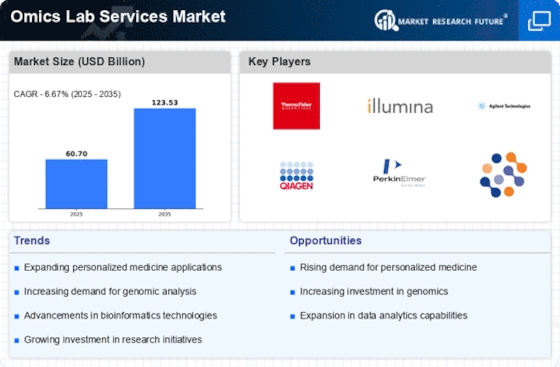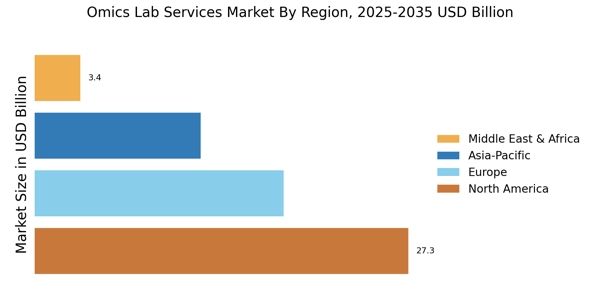Increased Investment in Biotechnology
The Omics Lab Services Market is benefiting from increased investment in biotechnology, which is becoming a focal point for innovation and growth. Governments and private investors are channeling substantial funds into biotech research, particularly in areas such as drug discovery and development. This influx of capital is likely to enhance the capabilities of omics labs, allowing them to offer more sophisticated services. For example, the biotechnology sector is projected to reach USD 727 billion by 2025, reflecting a growing recognition of the potential of omics technologies in addressing complex health challenges. As a result, the Omics Lab Services Market is poised to expand, driven by the need for advanced analytical services that support biotechnological advancements.
Rising Demand for Personalized Medicine
The Omics Lab Services Market is experiencing a notable surge in demand for personalized medicine. This trend is driven by the increasing recognition of the importance of tailoring medical treatments to individual genetic profiles. As healthcare providers seek to enhance patient outcomes, the integration of omics technologies, such as genomics and proteomics, becomes essential. According to recent estimates, the personalized medicine market is projected to reach USD 2 trillion by 2030, indicating a robust growth trajectory. This growth is likely to propel the demand for omics lab services, as they provide critical insights into genetic variations and disease predispositions. Consequently, the Omics Lab Services Market is positioned to benefit significantly from this shift towards personalized healthcare solutions.
Advancements in Research and Development
The Omics Lab Services Market is significantly influenced by advancements in research and development across various scientific fields. Innovations in sequencing technologies, bioinformatics, and analytical methods have enhanced the capabilities of omics labs, enabling more comprehensive analyses of biological samples. For instance, next-generation sequencing has drastically reduced the cost and time required for genomic studies, making it more accessible for researchers. The global market for sequencing technologies is expected to grow at a compound annual growth rate of over 20% in the coming years. This rapid evolution in R&D not only fosters the growth of the Omics Lab Services Market but also encourages collaboration among academic institutions, biotechnology firms, and pharmaceutical companies, further driving demand for omics services.
Regulatory Support for Omics Technologies
The Omics Lab Services Market is positively impacted by regulatory support aimed at fostering the adoption of omics technologies. Regulatory bodies are increasingly recognizing the value of omics data in clinical settings, leading to the establishment of guidelines that facilitate the integration of these technologies into healthcare practices. For instance, the FDA has been actively working on frameworks that support the use of genomic data in drug development and personalized medicine. This regulatory backing not only enhances the credibility of omics services but also encourages investment in the sector. As a result, the Omics Lab Services Market is likely to experience growth, driven by the establishment of a conducive regulatory environment that promotes innovation and the application of omics technologies in clinical research.
Growing Awareness of Preventive Healthcare
The Omics Lab Services Market is increasingly shaped by the growing awareness of preventive healthcare among populations. As individuals become more proactive about their health, there is a rising demand for services that can identify genetic predispositions to diseases. Omics technologies play a crucial role in this preventive approach, offering insights that can lead to early interventions. The Omics Lab Services is anticipated to reach USD 4 trillion by 2026, indicating a significant shift in healthcare paradigms. This trend is likely to drive the demand for omics lab services, as healthcare providers seek to incorporate genetic testing and analysis into routine health assessments, thereby enhancing the overall effectiveness of preventive strategies.
.png)

















